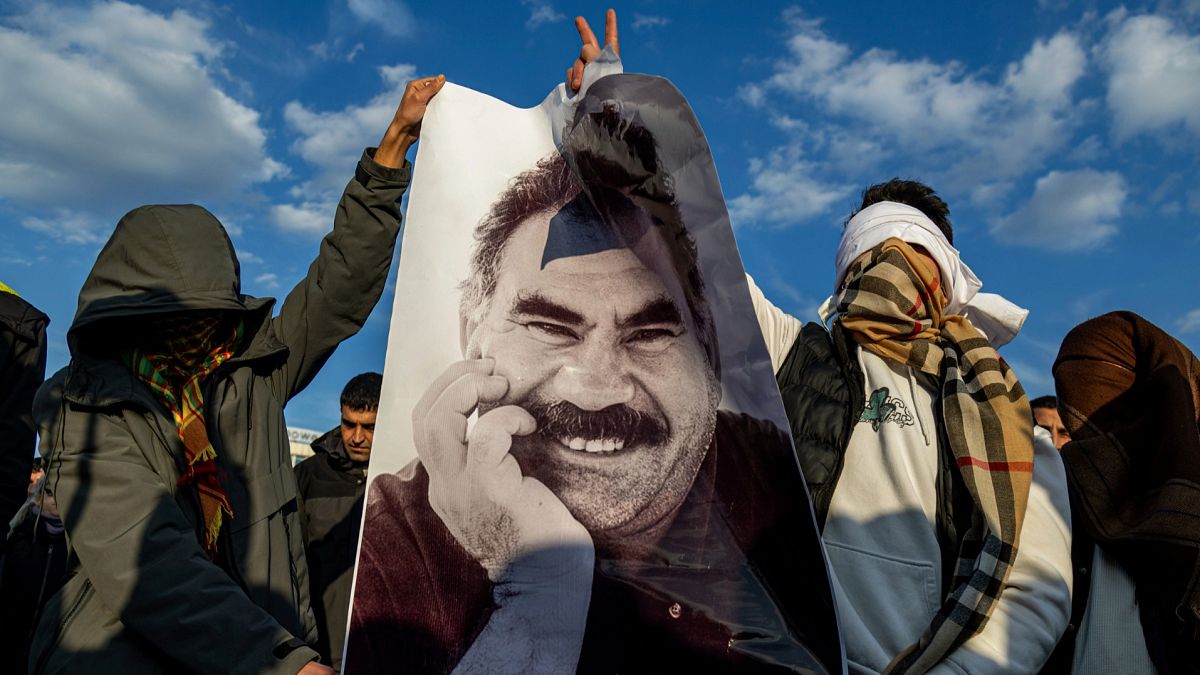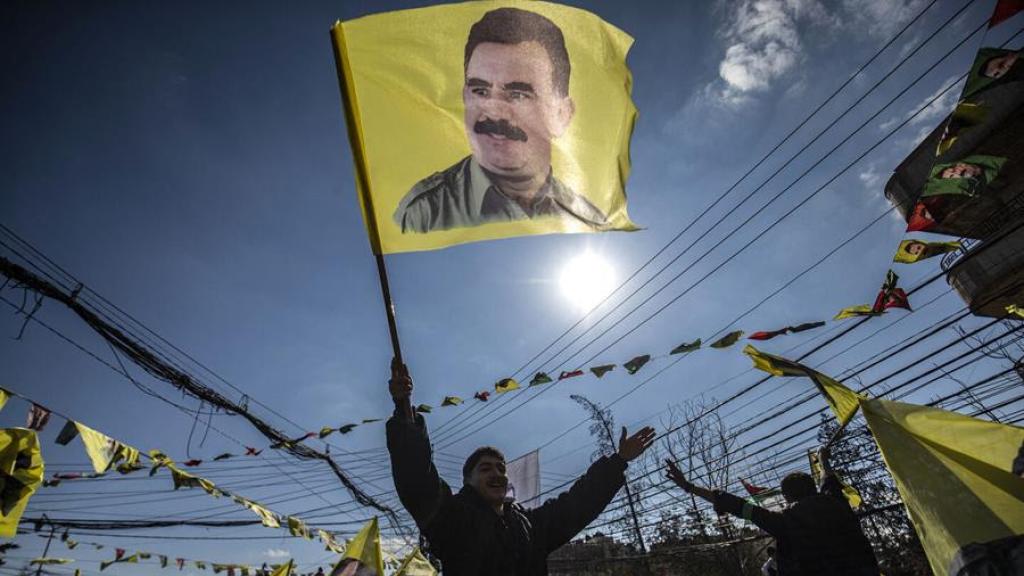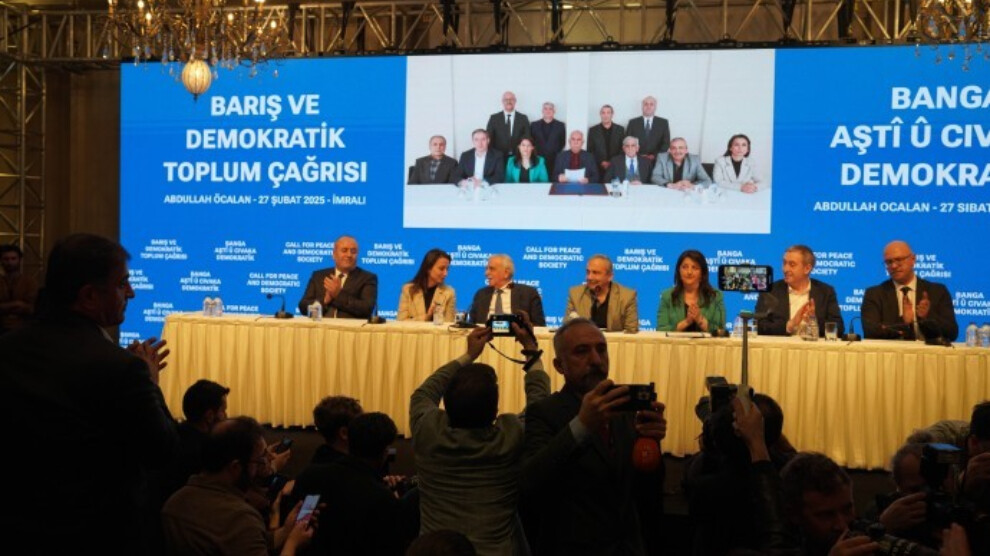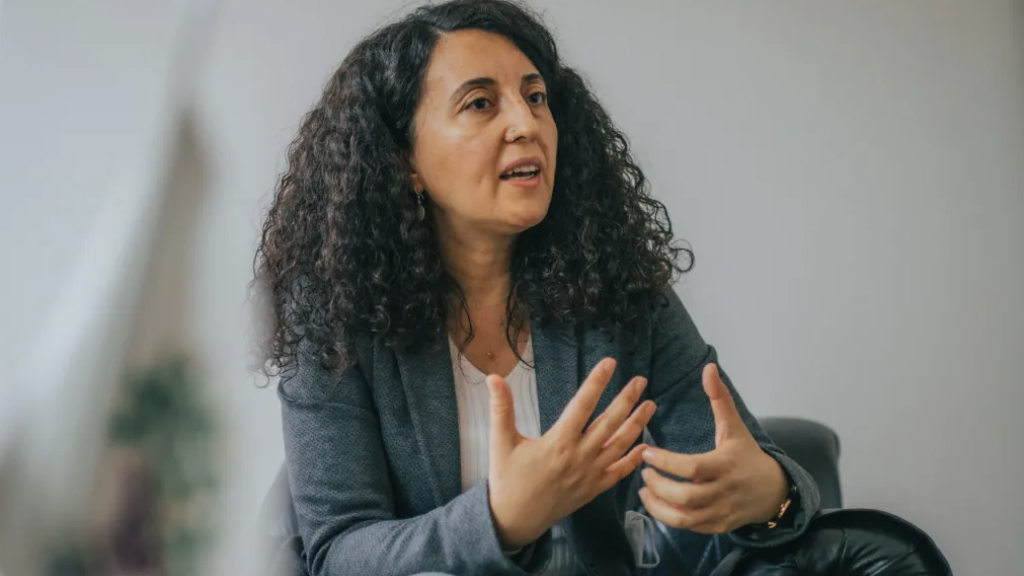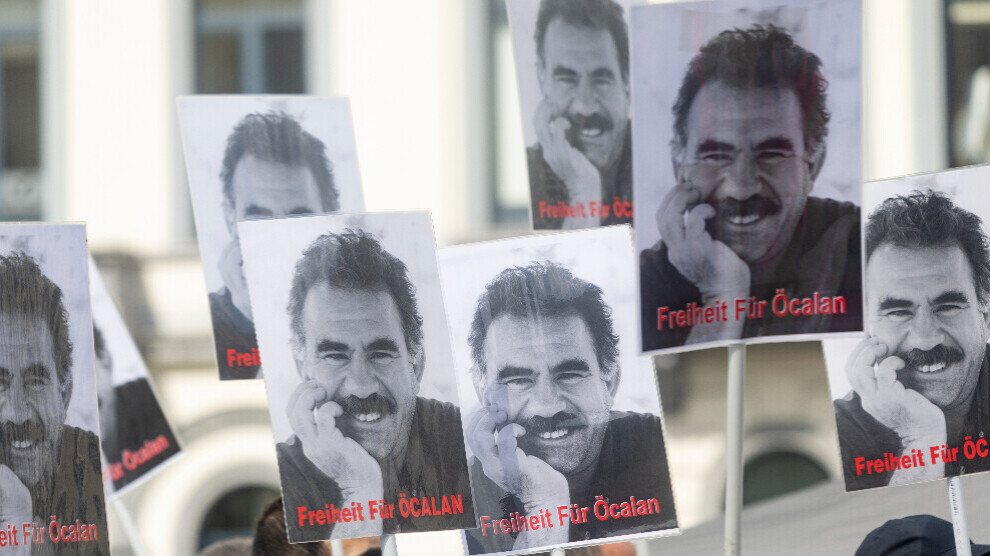By AFP
December 28, 2024

A delegation from Turkey's main pro-Kurdish DEM party is due to visit jailed PKK leader Abdullah Ocalan, who is serving life on a prison island off Istanbul - Copyright AFP YASIN AKGUL
Fulya OZERKAN
A delegation from Turkey’s main pro-Kurdish DEM party on Saturday visited jailed PKK leader Abdullah Ocalan, who is serving life on a prison island off Istanbul, party officials said.
The visit would be the party’s first in almost 10 years.
DEM’s predecessor, the HDP party, last met Ocalan in April 2015.
“The delegation left in the morning,” a party source told AFP, without elaborating how they would travel to the island for security reasons.
On Friday, the government approved DEM’s request to visit Ocalan, who founded the Kurdistan Workers’ Party (PKK) nearly half a century ago and has languished in solitary confinement since 1999.
The PKK is regarded as a “terror” organisation by Turkey and most of its Western allies, including the United States and European Union.
The DEM party delegation is made up of two lawmakers — Sirri Sureyya Onder and Pervin Buldan. They are not expected to make a statement after the visit, the same source told AFP.
DEM’s co-chair Tuncer Bakirhan said he hoped the talks with Ocalan would “open a new era” for a democratic settlement to the Kurdish problem.
“While I speak here, our delegation is currently meeting with Mr Abdullah Ocalan at Imrali (island). We believe it’s important,” he told reporters in the Uludere district near the Iraqi border.
– ‘Door must be unlocked’-
He was attending a commemoration ceremony marking the anniversary of 2011 killing of 34 civilians by a Turkish airstrike, an incident which was later called “Uludere or Roboski massacre”.
“Imrali’s door must be unlocked,” Bakirhan said.
“I hope that the discussions there will enable the Kurdish issue to be resolved through democratic means and on a democratic basis.”
Detained 25 years ago in a Hollywood-style operation by Turkish security forces in Kenya after years on the run, Ocalan was sentenced to death.
He escaped the gallows when Turkey abolished capital punishment in 2004 and is spending his remaining years in an isolation cell on the Imrali prison island south of Istanbul.
Saturday’s rare visit became possible after President Recep Tayyip Erdogan’s nationalist ally Devlet Bahceli invited Ocalan to come to parliament to renounce “terror”, and to disband the militant group.
Bahceli, who heads the ultra-nationalist MHP party, is fiercely hostile to the PKK.
-‘Historic’-
Erdogan backed the unprecedented appeal as a “historic window of opportunity”.
“My dear Kurdish brothers, we expect you to firmly grasp (Bahceli’s) sincerely outstretched hand,” he said in October, urging them to join in efforts to build what he called the “century of Turkey”.
Soon after Bahceli’s call, Ocalan was allowed his first family visit since March 2020, prompting DEM to make its own request to the justice ministry to visit the 75-year-old militant.
PKK militants subsequently claimed responsibility for an attack in October on a Turkish defence firm that killed five. That delayed the government approval of DEM’s request.
For several years up to 2015, Ocalan was engaged in talks with authorities, when then-prime minister Erdogan called for a solution for what is often called Turkey’s “Kurdish problem”.
The peace process and a truce collapsed in 2015, sparking the resumption of violence, especially in the Kurdish-majority southeast.
The government’s approval of the DEM party visit comes after rebels in neighbouring Syria overthrew strongman president Bashar al-Assad on December 8.
Turkey routinely targets Kurdish fighters in northern Syria and Iraq.
By: TII team
Date:
December 28, 2024

ISTANBUL,— A delegation from Turkey’s pro-Kurdish Democracy and Equality Movement (DEM) visited imprisoned PKK leader Abdullah Ocalan on Saturday, marking the first such meeting in nearly a decade, party officials confirmed.
Ocalan, the founder of the Kurdistan Workers’ Party (PKK), has been held in solitary confinement on the island prison of Imrali, south of Istanbul, since 1999.
According to a DEM source, the delegation, consisting of lawmakers Sirri Sureyya Onder and Pervin Buldan, departed early Saturday morning. Security concerns prevented disclosure of their travel arrangements.
The visit was approved Friday by the Turkish government, making it the first contact since April 2015, when Ocalan last met with representatives of the DEM’s predecessor, the Peoples’ Democratic Party (HDP).
Ocalan established the PKK in 1978, leading an armed insurgency against the Turkish state in 1984 to demand greater autonomy for Kurds, who make up an estimated 22.5 million of Turkey’s 84-million population.
The conflict, which has lasted for decades, has claimed more than 40,000 lives. Turkey, the United States, and the European Union classify the PKK as a “terrorist” organization.
DEM co-chair Tuncer Bakirhan expressed optimism about the meeting, calling it a potential step toward resolving Turkey’s long-standing Kurdish issue.
During a memorial ceremony in Uludere, near the Iraqi border, marking the 2011 Turkish airstrike that killed 34 civilians—an incident later referred to as the “Uludere” or “Roboski massacre“—Bakirhan called for action. “The door to Imrali must be opened,” he said. “We hope these discussions will lay the groundwork for a democratic resolution.”
Ocalan’s detention followed a dramatic 1999 operation by Turkish security forces in Kenya. Initially sentenced to death, he was spared after Turkey abolished capital punishment in 2004.
President Recep Tayyip Erdogan, backed by his nationalist ally Devlet Bahceli, has recently signaled a potential shift in addressing the Kurdish conflict. In October, Bahceli, leader of the far-right Nationalist Movement Party (MHP), invited Ocalan to denounce terrorism and disband the PKK. Erdogan called this a “historic window of opportunity” for reconciliation.
The government’s approval of DEM’s visit comes amid heightened tensions. In October, PKK militants claimed responsibility for a deadly attack on a Turkish defense facility, delaying the delegation’s request to meet Ocalan.
While previous peace talks between Ocalan and Turkish authorities collapsed in 2015, sparking renewed violence, Saturday’s visit raises cautious hopes for renewed dialogue. However, no immediate statement is expected from the delegation following their meeting.
Turkey continues its military operations targeting Kurdish fighters in northern Syria and Iraq, further complicating prospects for peace. Recent developments in neighboring Syria, including the ousting of President Bashar al-Assad by rebels, have added another layer of complexity to the region’s Kurdish dynamics.
Observers await further signals from both the government and Ocalan on whether this visit could lead to meaningful steps toward resolving one of Turkey’s most entrenched conflicts.
(Credit: AFP)
Copyright © 2024 The Insight International. All rights reserved
DEM Party deputies Sırrı Süreyya Önder and Pervin Buldan met with Abdullah Öcalan in İmralı Island today.
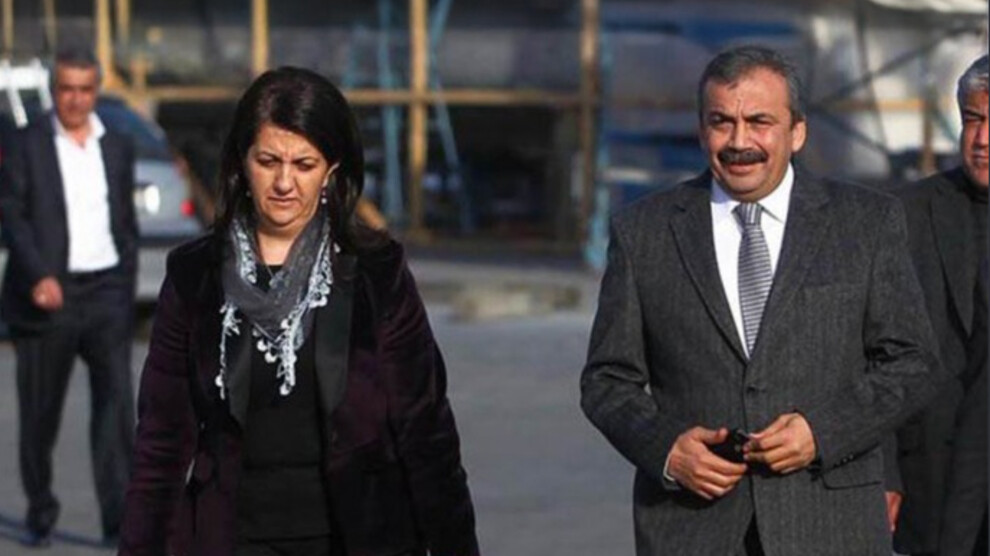
ANF
NEWS DESK
Saturday, 28 December 2024
The Peoples' Equality and Democracy Party (DEM Party) MPs Sırrı Süreyya Önder and Pervin Buldan travelled to Imrali Prison Island to meet with Abdullah Öcalan earlier today after the Turkish Ministry of Justice granted the requested visit permit.
While the delegation returned from İmralı, DEM Party made the following statement: “Our delegation consisting of Pervin Buldan and Sırrı Süreyya Önder held a meeting with Mr Abdullah Öcalan in İmralı today. This meeting has ended and our delegation has returned. Our delegation will share information and evaluations about the content of this meeting with the press and the public in the following hours.”
Sırrı Süreyya Önder and Pervin Buldan were members of the İmralı Delegation during the talks between the Turkish state and Abdullah Öcalan between 2013 and 2015. On 28 February 2015, the ‘Dolmabahçe Consensus’ was declared in Istanbul. The agreement was a ten-point plan negotiated between Abdullah Öcalan and the Turkish state to resolve the Kurdish question. The peace process was terminated shortly afterwards by Recep Tayyip Erdoğan.
The founder of the PKK, Abdullah Öcalan, has been held incommunicado on the prison island of Imrali since his illegal abduction from Kenya to Turkey in 1999. The last contact with him was a visit from his nephew, Ömer Öcalan, on 23 October.
Background
Kurdish People’s Leader Abdullah Öcalan, Ömer Hayri Konar, Hamili Yıldırım and Veysi Aktaş are kept under severe isolation conditions in Imralı F Type High Security Prison in the Sea of Marmara.
The right of Abdullah Öcalan and fellow prisoners in Imralı to meet with their families and lawyers is being denied by the authorities, citing "disciplinary penalties". The reasons and file numbers of these disciplinary penalties are not shared with their lawyers despite all applications and objections.
From 27 July 2011 to date, only 5 lawyer visits were allowed between May and August 2019. The last meeting of lawyers with the Kurdish leader took place on 7 August 2019. During the last lawyer meeting 5 years ago, Öcalan stated that he could end the war completely within a week in the face of the possibility of conflict in Serekanîye and Gire Spî, saying that, otherwise, deep social wounds would be opened and the economy would not be able to bear this situation. However, his call for a solution and dialogue was left unanswered. After the meeting with Abdullah Öcalan 5 years ago, the ban on lawyer visits started to be implemented.
The last 6-month ban on lawyer visits to Öcalan and fellow prisoners in İmralı was issued by Bursa Execution Judgeship on 6 November. With this ban, the Kurdish leader has been banned from seeing his lawyer for 6 months at least 14 times in the last 8 years.
Öcalan’s last face-to-face meeting with his family took place on 3 March 2020 and his last telephone conversation on 25 March 2021.
After four years, the Kurdish leader met face to face with his nephew Ömer Öcalan on 23 October 2024. During the meeting, he stated that the isolation continued and that he would be able to move the conflict from the level of violence to a political and legal level if the necessary conditions were in place.
The meeting took place amid discussions on possible talks with Öcalan. MHP (Nationalist Movement Party) Leader Devlet Bahçeli shook hands with the DEM Party group at the opening of the Grand National Assembly of Turkey (TBMM) on 1 October, starting discussions about a possible resolution process with the Kurds. In his speech at the party's group meeting in mid-October, Bahçeli further called on Abdullah Öcalan in İmralı Prison to “unilaterally declare the end of terrorism and the liquidation of his organization”.
On 12 December, Asrin Law Office made a new application to the European Committee for the Prevention of Torture (CPT) requesting “an urgent (ad-hoc) visit to İmralı Prison in the face of the reality that the current conditions in İmralı have continued in uncertainty since your last visit on 22 September 2022 and have gradually hardened, and that the conditions have reached a new level in a period of more than 2 years.”
Lawyer Mustafa Özoral said that the isolation of Abdullah Öcalan in Imralı should be lifted and the ‘right to hope’ respected.
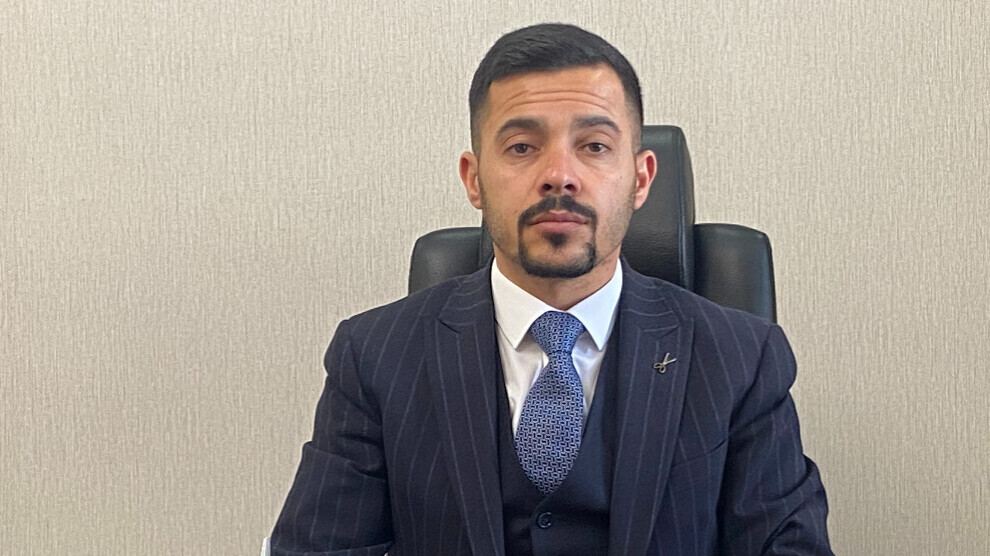
ANF
VAN
Saturday, 28 December 2024
The isolation of Kurdish People's Leader Abdullah Öcalan continues. Lawyer Mustafa Özoral, a member of the Association of Lawyers for Freedom (ÖHD), spoke to ANF about isolation in Imrali and the ‘right to hope’.
How do you define the concept of isolation?
Isolation means seclusion, isolation of people from their families, loved ones and society and not allowing them to communicate with anyone. In Turkey, isolation is particularly heavy against Mr Abdullah Öcalan. This isolation imposed on Mr Öcalan is not only limited to family meetings, because lawyer meetings are also prevented.
Looking deeper into the isolation regime in Imralı, how did this process progress?
Abdullah Öcalan's last family visit was on 23 October 2024, the previous one was on 3 March 2020. He was only able to meet with his family 6 months in the last 10 years. However, he is not only banned from seeing his family, but also from seeing his lawyers. Öcalan was able to meet with his lawyers only 5 times between 2011 and 2019. On 23 October 2023, after meeting with his nephew, he received a disciplinary penalty and was banned from seeing his lawyer for 6 months.
Is this isolation limited to Mr Öcalan or is it imposed on other prisons as well?
Isolation first started in Imrali, but soon was imposed on the whole society. The state first tried practices in violation of the European Convention on Human Rights in Imralı. Since not enough voices were raised, these practices were imposed to other prisons as well. Not only the inability to meet with family, but also the inability to express one's thoughts is a state of isolation. Abdullah Öcalan has been in prison for 25 years and during this time he has not been able to express his ideas. This is a severe form of isolation.
How do you evaluate the recent statements by MHP Leader Devlet Bahçeli?
Bahçeli's statement on 22 October 2024 goes contrary to the statements made in the official discourse for years that there was no isolation. Bahçeli said that isolation would be lifted if the PKK was disbanded. This is actually an acknowledgement of all those years of isolation. Talking about a peace process without lifting the isolation, means that such a process could not be managed properly. If Abdullah Öcalan does not have the right to meet with his family and lawyers, the peace and solution process cannot function properly.
How do you evaluate the ‘right to hope’?
The right to hope does not legally exist in Turkey. Even if the President of the Republic has the sole power of pardon, this does not mean there is the right to hope. The European Convention on Human Rights (ECtHR), to which Turkey is a party, says that the conditions of life sentences should be re-evaluated. The ECtHR states that life imprisonment is contrary to the philosophy of criminal law and that the sentence should be given with the aim of rehabilitating the person. For this reason, it is stated that the conditions of the person should be reviewed at the end of 25 years in prison.
How do you evaluate Turkey's current criminal laws in this respect?
Turkey abolished the death penalty in 2002 and in parallel life imprisonment sentences, except for political offences, have increase d. However, the right to hope in line with ECtHR judgements is still not sufficiently implemented in Turkey. Fight against terrorism Law No. 3713 and Penal Execution Law No. 5275 prevent conditional release and contravene the principle of equality. Abdullah Öcalan has completed 25 years in jail, but Turkey needs to change the legislation in line with the European Union and recognise the right to hope.
How will Mr Öcalan contribute to the democratic solution and peace if proper conditions are created?
Abdullah Öcalan has been calling for years to work for peace. 11 years ago, under Öcalan's instructions, guerrillas withdrew from Turkey and Kurdistan and there was a period of no conflict. This shows that Öcalan is serious when he talks about peace. However, the current conditions of isolation constitute an obstacle instead of contributing to peace and democracy. The government is ignoring this, so that is not serving peace.
What call would you like to make regarding isolation and the right to hope?
Our call is to change the legislation by which people sentenced to aggravated life imprisonment, especially political prisoners, remain in prison until death. The right to hope is crucial not only for Abdullah Öcalan, but for all political prisoners. This amendment is essential for the construction of a democratic society and for the revival of hope for peace.



















